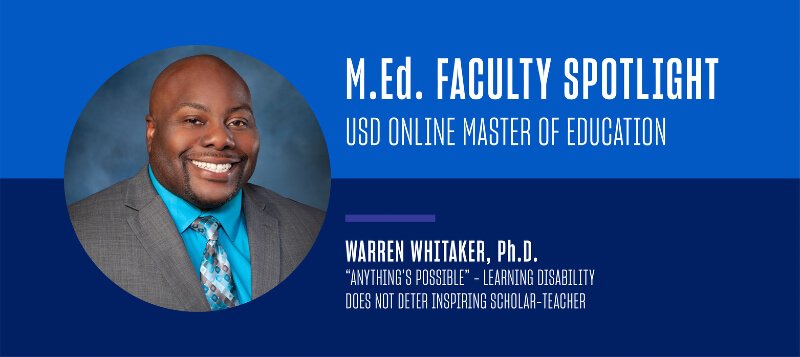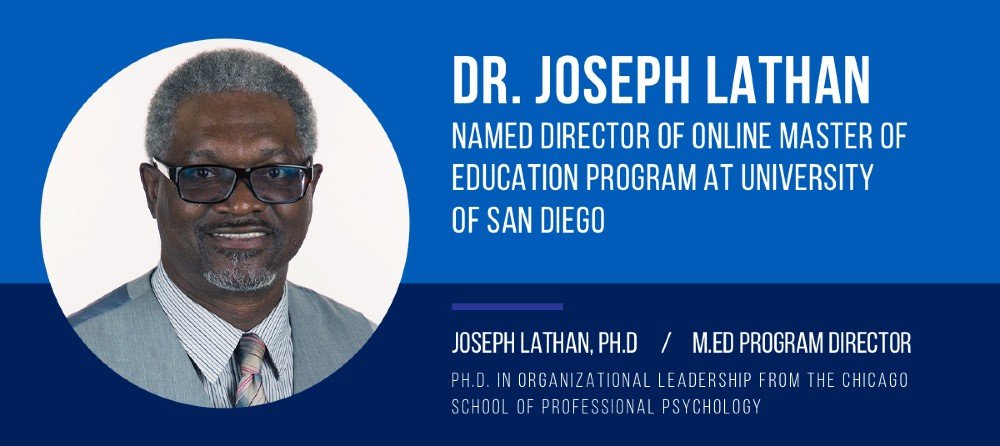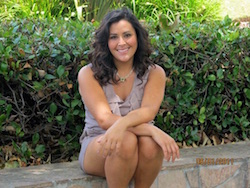Warren Whitaker’s journey as a “professional student, as some friends call me” has dovetailed beautifully with his career as a professional teacher.
Fascinated with psychology since high school (“the mind … how people reason”), he earned a bachelor’s degree from Lock Haven University in Pennsylvania and then went on to Bucknell University where he earned a Master of Science in Education while pursuing a growing interest in School Psychology. Early in his career, he worked as a counselor and then spent six years as a school psychologist.
Around August 2014, his lifelong education journey shifted into high gear. That’s when he began a stint as a research graduate assistant at the University of San Diego, engaging in such projects as evaluating “the use of mobile learning devices in PK-12 classrooms.”
The following September, he began teaching as an adjunct professor at USD’s School of Leadership and Education Sciences (SOLES). He also began working toward a doctoral degree – focusing his dissertation on the postsecondary transition experiences of students with disabilities and earning his PhD in Leadership Studies from USD in 2018. Today Dr. Whitaker serves on the faculty of the University of San Diego’s online Master of Education degree program.
But wait there’s more. He recently completed a two-year postdoctoral fellowship at Oakland University in Auburn Hills and Rochester Hills, Michigan, where his research focused on educational equity, higher education disability experiences and special education policy discourse.
Oh yeah, and he also currently serves as an assistant professor in the hybrid-format Educational Leadership for Diverse Learning Communities Ed.D. program at Molloy College in Rockville Centre, NY.
Don’t worry. After nearly two decades of 24/7 teaching and learning – bachelor’s, master’s, PhD and postdoc; online, on-campus and hybrid formats – he still finds time for a couple of side passions: working out and shopping. He’s a big fan of Macy’s, saying, “I was definitely able to visit all of the Macy’s locations in San Diego County.”
He also carved out a few moments recently to talk about his career in education, sharing insights into such topics as social justice, ensuring accessibility to all and the role of empathy in education.
Confronting Challenges in Education – “Anything’s Possible“
For Dr. Whitaker, some of his passions and special interests in education connect directly to his lived experiences as a Black male and as a person with a learning disability.
“I identify as ADHD Inattentive Type and nonverbal learning disability. The way I process is different from how other people process,” he said. “So I definitely value … being able to really give voice to it so that others who may be going down this similar path know there can be opportunities. We have to address ableism. And we have to get through some societal concerns as far as just making sure everything’s accessible. But I think that I can use myself as a vehicle for other people coming behind me down the same road.”
That role feels like a welcome responsibility to him, as he believes that “sometimes people in situations may not think that things are attainable. It definitely takes work, but I think that anything’s possible.”
His work teaching teachers who choose to earn their MEd at USD connects to a special interest in Universal Design for Learning (UDL), an inclusive learning approach that provides students of all abilities with access to flexible learning choices and effective paths for achieving educational goals in spaces where they experience a sense of belonging.
“I definitely tend to lean on and incorporate Universal Design for Learning to make sure that all my content is accessible to the diverse learners that I have in my courses,” he said. “There’s definitely inequities that impact students. So I want to be able to find ways to implement those discussions into some of the work that we’re doing, to really have those constructive conversations that are needed, and that will hopefully initiate some real-life work” that leads to progress.
Diversity and Social Justice in a Global Classroom
With regard to his role as an African-American male devoted to educational opportunity for all, this year he participated in a Black History Month Q&A conversation in which he said, “All of the achievements, opportunities, accolades, liberties, etc. that I possess are because of the Black males and females that sacrificed everything, including in some instances their lives, so that someone like me would have the opportunity to have a lifestyle beyond their dreams and imaginations. It also means that I must continue my part in furthering the opportunities for the next generation of Black males and females that are coming after me.”
As someone who has held an awareness of “social justice for different populations” throughout his life, Dr. Whitaker was initially drawn to the University of San Diego in part because of the school’s longstanding commitment to social justice and related issues. The university strongly emphasizes the importance of “confronting humanity’s urgent challenges” – aspiring to “help our students graduate with a global perspective as compassionate citizens and ethical leaders” and to connect them with opportunities to “work together to address social justice issues in our community and in the wider world around us.”
In terms of how this philosophy plays out for MEd aspirants considering the USD program, Dr. Whitaker said, “At the University of San Diego, I know that you’ll have a diverse range of faculty that have diverse experiences, diverse identities, diverse thinking – all with that focus on learner-centered [education], making sure the students are the center of whatever’s happening.”
The program’s online format also contributes to the sense of diversity in the USD MEd experience. “One of the big advantages is that you can reach multiple students in different geographic locations. I recall experiences having students in China, students in the United Arab Emirates, and other locations around the world,” said Dr. Whitaker, also mentioning Chile, Jamaica, Ireland and other European nations, “and just the richness that that adds to the discussions of how education’s framed; the systems of policy, practices and procedures, the pedagogy; it all definitely provides positive contributions to the course. And I think that’s a big asset of the program.”
At USD: a Supportive, Collaborative Learning Environment
Reflecting on his decision to attend USD as an on-campus graduate student, and then to teach online at the university where he earned his PhD, Dr. Whitaker said that in addition to “the location and the scenic views and everything,” what he found at USD was “a really supportive environment [where] you’re free to explore and definitely get into your interests.” He even uses the term “family” to describe his connection to the university and its innovative MEd experience.
Part of the richness of the overall MEd experience that he enjoys is the “really in-depth, valuable discussions” about all of the topics discussed above, and also about the need to infuse education with empathy.
He loves exploring, with students and colleagues alike, such big-picture education questions as: “How do we value the experiences of our learners in a way that’s meaningful and also humanizing?” and “What’s that going to mean, for the future of education?”
Visit the University of San Diego’s online Master of Education degree homepage to learn more.




